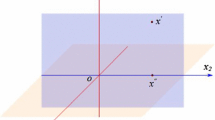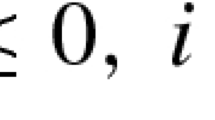Abstract
Sparse optimization problems have gained much attention since 2004. Many approaches have been developed, where nonconvex relaxation methods have been a hot topic in recent years. In this paper, we study a partially sparse optimization problem, which finds a partially sparsest solution of a union of finite polytopes. We discuss the relationship between its solution set and the solution set of its nonconvex relaxation. In details, by using geometrical properties of polytopes and properties of a family of well-defined nonconvex functions, we show that there exists a positive constant \(p^*\in (0,1]\) such that for every \(p\in [0,p^*)\), all optimal solutions to the nonconvex relaxation with the parameter p are also optimal solutions to the original sparse optimization problem. This provides a theoretical basis for solving the underlying problem via its nonconvex relaxation. Moreover, we show that the problem we concerned covers a wide range of problems so that several important sparse optimization problems are its subclasses. Finally, by an example we illustrate our theoretical findings.



Similar content being viewed by others
References
Bradley PS, Mangasarian OL (1998) Feature selection via concave minimization and support vector machines. ICML 98:82–90
Candés EJ, Romberg J, Tao T (2006) Robust uncertainty principles: exact signal reconstruction from highly incomplete frequency information. IEEE Trans Inf Theory 52(2):489–509
Candés EJ, Tao T (2005) Decoding by linear programming. IEEE Trans Inf Theory 51(12):4203–4215
Chartrand R (2007) Exact reconstruction of sparse signals via nonconvex minimization. IEEE Siganl Process Lett 14(10):707–710
Chen X, Xiang S (2016) Sparse solution of linear complementarity problems. Math Program 159(1):539–556
Davies ME, Gribonval R (2009) Restricted isometry constants where \(l_p\) sparse recovery can fail for \(0 < p < 1\). IEEE Trans Inf Theory 55(5):2203–2214
Foucart S, Lai MJ (2009) Sparest solutions of underdetermined linear systems via \(l_q\)-minimization for \(0 < q\leqslant 1\). Appl Comput Harmon Anal 26(3):395–407
Foucart S, Rauhut H (2013) A mathematical introduction to compressive sensing. Birkhäuser, Basel
Fung G, Mangasarian O (2011) Equivalence of minimal \( \ell _0 \) and \( \ell _p \) norm solutions of linear equalities, inequalities and linear programs for sufficiently small \(p\). J Optim Theory Appl 151:1–10
Gribonval R, Nielsen M (2007) Highly sparse representations from dictionaries are unique and independent of the sparseness measure. Appl Comput Harmon Anal 22(3):335–355
Gribonval R, Nielson M (2003) Sparse representations in unions of bases. IEEE Trans Inf Theory 49(12):3320–3325
Grünbaum B (2003) Convex polytopes, 2nd edn. Springer, New York
Haddou M, Migot T (2015) A smoothing method for sparse optimization over polyhedral sets. Modelling, computation and optimization in information systems and management sciences. Springer, Berlin, pp 369–379
Lai MJ, Wang J (2011) An unconstrained \(l_p\) minimization with \(0 < q\leqslant 1\) for sparse solution of underdetermined linear systems. SIAM J Optim 21(1):82–101
Lyu Q, Lin Z, She Y et al (2013) A comparison of typical \(\ell _p\) minimization algorithms. Neurocomputing 119:413–424
Natarajan BK (1995) Sparse approximate solutions to linear systems. SIAM J Comput 24(2):227–234
Peng J, Yue S, Li H (2015) NP/CMP equivalence: a phenomenon hidden among sparsity models \(\ell _0 \) minimization and \( \ell _p \) minimization for information processing. IEEE Trans Inf Theory 61(7):4028–4033
Rockafellar RT (1970) Convex analysis. Princeton University Press, Princeton
Saab R, Chartrand R, Yilmaz O (2008) Stable sparse approximations via nonconvex optimization. In: Proceedings of international conference on acoustics speech and signal processing, pp 3885–3888
Sun QY (2012) Recovery of sparsest signals via \(l_p\) minimization. Appl Comput Harmon Anal 32(3):329–341
Voroninski V, Xu Z (2016) A strong restricted isometry property, with an application to phaseless compressed sensing. Appl Comput Harmon Anal 40(2):386–395
Wang M, Xu WY, Tang A (2011) On the performance of sparse recovery via \(l_p\)-minimization (\(0\leqslant p \leqslant 1\)). IEEE Trans Inf Theory 57(11):7255–7278
Xu ZB, Chang XY, Xu FM, Zhang H (2012) \(L_{1/2}\) regularization: a thresholding representation theory and a fast solver. IEEE Trans Neural Netw Learn Syst 23(7):1013–1027
You G, Huang ZH, Wang Y (2017) A theoretical perspective of solving phaseless compressive sensing via its nonconvex relaxation. Inf Sci 415:254–268
Zhang M, Huang ZH, Zhang Y (2013) Restricted \(p\)-isometry properties of nonconvex matrix recovery. IEEE Trans Inf Theory 59(7):4136–4323
Ziegler GM (1995) Lectures on polytopes, Revised First Edition. Springer, New York
Author information
Authors and Affiliations
Corresponding author
Additional information
Publisher's Note
Springer Nature remains neutral with regard to jurisdictional claims in published maps and institutional affiliations.
This work was partially supported by the National Natural Science Foundation of China (Grant Nos. 11431002 and 11871051).
Rights and permissions
About this article
Cite this article
You, G., Huang, ZH. & Wang, Y. The sparsest solution of the union of finite polytopes via its nonconvex relaxation. Math Meth Oper Res 89, 485–507 (2019). https://doi.org/10.1007/s00186-019-00660-2
Received:
Published:
Issue Date:
DOI: https://doi.org/10.1007/s00186-019-00660-2




